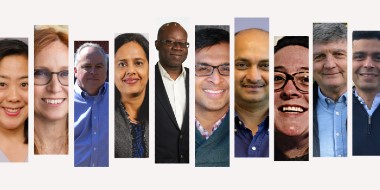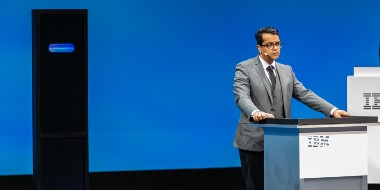Big Data
The Future of Knowledge Work: Turbocharging Expertise
December 8, 2015 | Written by: Steve Hamm
Categorized: Big Data | Cloud Computing | Cognitive Computing | Data Analytics | High Performance Computing | IBM Research | IBM Watson
Share this post:
The first serious computer program I wrote in high school was a basic “expert system” to help my dad, a judge in India, handle auto accident compensation cases. Back then, we imagined a world where expertise of all sorts could be captured in computer system, but, as you can imagine, I ran into all the limitations of rule-based systems. Computers of the day weren’t up to the task of capturing and scaling expertise.
Today, 30 years later, the world is awash in data and we have new cognitive computing technologies that are capable of ingesting vast amounts of diverse data, reasoning over it, learning from patterns in the data and feedback from people, and interacting with us in ways that are more natural to us.
The ability of cognitive systems to capture knowledge and place it at anybody’s fingertips can augment the performance of our most accomplished professionals and scientists—even Nobel Laureates—and can effectively elevate the expertise of others. Smart machines make the rest of us more like the best.
(Editor’s note: This blog post is based on a presentation that Guru is making tomorrow at the Nobel Week Dialogue: The Future of Intelligence, in Gothenburg, Sweden. If you want to watch in real time (4:50 a.m. US Eastern Time, Dec. 9) or watch the replay, click here. )
These days, some in the media and in the tech community have raised the alarm about the capabilities of smart machines. Will they take our jobs? Throughout human history, whenever powerful new technologies emerge, they disrupt the status quo. Old industries and jobs disappear. New ones are created. The process is happening again in this new industrial revolution, the cognitive era. This time, the way we perform “knowledge work” itself is changing.
In the knowledge economy, the amount of information we need to do our jobs well is extraordinary. We have to be aware of so many things and weigh carefully when we make decisions—everything from regulation and competitive factors to our own biases and mental shortcuts. And, often, we have to make critical decisions in real time. The task can be overwhelming. In these scenarios, a cognitive computing assistant will be invaluable.
I believe that that potential for these new technologies to do good far outweighs the perceived risks. This new wave of technologies is designed to augment human cognition—complimenting the unique strengths of humans, such as common sense, value judgments and self-direction, with the unique strengths of machines, including large scale math, pattern recognition, and statistical reasoning. In effect, cognitive computing is a partnership between people and learning, reasoning machines. By combining capabilities, people and machines will produce better results than either one on their own.
This collaboration has the potential to expand expertise on a planetary scale and transform every knowledge-based profession. Another way to think about this is to consider the price of not knowing. Today, in every field, we make decisions based on incomplete information.
–We pay a price for not knowing what’s making a person sick. Shortly after IBM’s Watson cognitive computer beat two humans on the TV quiz show Jeopardy!, our researchers teamed up with physicians at Memorial Sloan Kettering Cancer Center to see if we could harness the power of Watson to improve cancer diagnoses and treatments. We chose cancer because it’s the second-highest cause of death in the United States, leading to more than half a million deaths per year and incurring untold billions in treatment costs.
Out of that collaboration came a technology solution called Watson for Oncology. It enables physicians to get the benefit to all of the available medical literature plus detailed information about treatments and outcomes. It also encapsulates the expertise of the top oncologists at MSK. Last week, Manipal Hospitals in Bangalore, India, announced it will adopt the technology to help physicians identify options for individualized, evidence-based cancer care across India.
–We pay a price for not knowing how to address environmental challenges.
This week in Paris, leaders of more than 150 countries are gathered to head off the worst effects of climate change. A poor understanding of the impacts of our dependency on carbon-based energy sources has put the human race in peril from rising sea levels, widespread droughts, and ever-more-violent storms. The impact on the global economy combined with the eventual price of taking actions to slow global warming will run into many trillions of dollars.
But, as IBM’s work on our global Green Horizon’s project is showing, by combining weather and climate data from vast new networks of smart sensors with learning systems capable of understanding the complex causes and effects of pollution and climate change, we can at last do something about it. We launched Green Horizons in China a year ago to help government agencies, electrical utilities and business comply with the central government’s ambitious goals for reducing pollution and shifting to renewable energy sources. Next, we’re going global with the program.
These examples address some of the most complex and costly challenges confronting society. It’s critical that the tech industry and the scientific community make rapid advances that help us progress against them at a gallop. But think of every major sphere of human activity and the people who drive it, everything from operating a bank to managing a city, and you have fertile ground for elevating expertise and augmenting human cognition with the help of machines.
Back in India 30 years ago, I was thrilled by the opportunity to use my rudimentary coding skills to help my dad do his job better. Today, my science and technology colleagues around the world and I stand at the threshold of a new era of computing and a new era for the human race—helping to make every sphere of life work better. Let’s make the best of it.
—
To learn more about the new era, read Smart Machines: IBM’s Watson and the Era of Cognitive Computing.
Meet the Newest IBM Fellows
Since the first class of IBM Fellows in 1962, IBM has honored its top scientists, engineers and programmers, who are chosen for this distinction by the CEO. Among the best and brightest of IBM’s global workforce are 12 new IBM Fellows who join 293 of their peers who have been so recognized over the last […]
Accelerating Digital Transformation with DataOps
Across an array of use cases, AI pioneers are employing a core set of new AI capabilities to unlock the value of data in new ways. According to the 2019 IBM Global C-suite study, leaders are using data 154% more to identify unmet customer needs, enter new markets, and develop new business models. These leaders […]
How IBM is Advancing AI Once Again & Why it Matters to Your Business
There have been several seminal moments in the recent history of AI. In the mid-1990s, IBM created the Deep Blue system that played and beat world chess champion, Garry Kasparov in a live tournament. In 2011, we unveiled Watson, a natural language question and answering system, and put it on the hit television quiz show, […]



